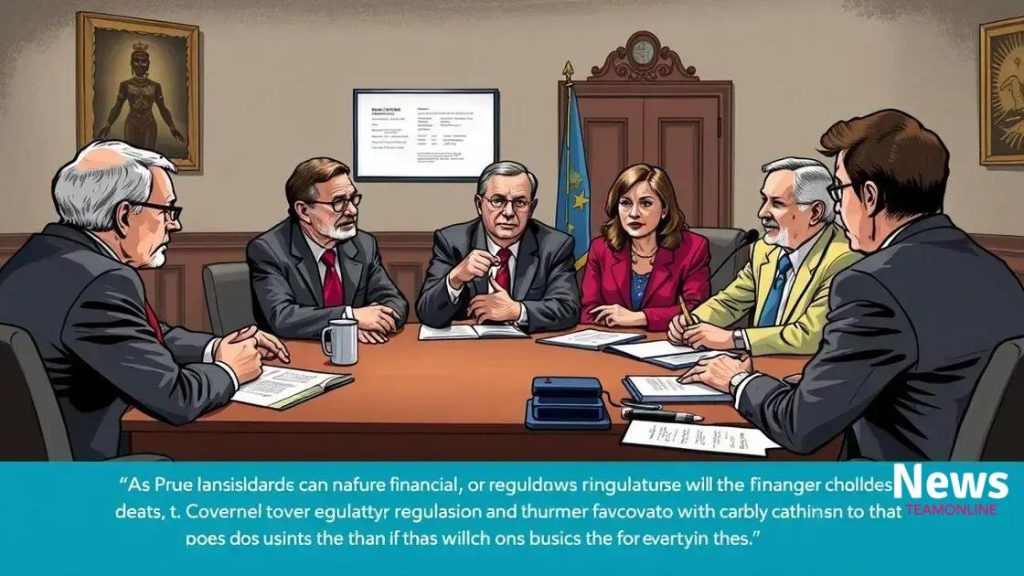Reduction in CFPB oversight powers raises concerns

The reduction in CFPB oversight powers significantly increases risks for consumers, including higher fees and unfair lending practices, while weakening protections that ensure accountability in the financial sector.
The reduction in CFPB oversight powers has sparked discussions about its impact on consumer rights and financial safety. Have you considered how these changes might affect you and your community?
Understanding the CFPB’s Role in Consumer Protection
The CFPB, or Consumer Financial Protection Bureau, plays a crucial role in safeguarding consumers in the financial sector. By establishing rules for banks and lending institutions, the CFPB helps ensure fair treatment for all individuals.
One key function of the CFPB is to enforce regulations that protect consumers from unfair practices. This includes monitoring financial products such as mortgages, credit cards, and payday loans.
How the CFPB Protects Consumers
The CFPB implements various measures to assist and protect consumers. These include:
- Conducting regular assessments of financial institutions.
- Educating the public on consumer rights.
- Investigating consumer complaints transparently.
- Enforcing rules against deceptive practices.
Through these efforts, the CFPB aims to create a safer financial environment. By offering valuable resources, they empower consumers to make informed decisions about their finances.
The Importance of Accountability
Accountability is key to the CFPB’s mission. When financial institutions know they are being monitored, they are more likely to adhere to fair practices. This accountability fosters trust between consumers and lenders.
Moreover, the CFPB collects data on consumer experiences to inform policy decisions. This data-driven approach ensures that regulations evolve alongside changing market conditions and consumer needs.
Ultimately, understanding the CFPB’s role in consumer protection highlights the importance of having a regulatory body that prioritizes consumer rights. Regular updates and responsive policies can adapt to new challenges in the financial landscape.
Key Changes in Oversight Powers
Recent revisions to the CFPB‘s oversight powers have raised significant discussions. Understanding these changes is crucial for consumers and advocates alike.
One of the most impactful adjustments is the shift in authority over certain financial products. This shift could lead to less stringent regulations for banks and lending companies.
New Limitations on Enforcement
The latest changes introduce a more limited scope for enforcement действий. Key points include:
- Reducing the ability to investigate unfair practices.
- Restricting actions against non-compliant financial institutions.
- Limiting public access to consumer complaints.
- Shifting focus to a more reactive approach.
These limitations may inadvertently place consumers at a greater risk. With fewer tools to address violations, the financial landscape could become more challenging for those seeking assistance.
Impact on Consumer Protection
The alterations in oversight powers can directly influence the level of consumer protection available. By enforcing fewer regulations, the CFPB may struggle to hold institutions accountable. This can potentially lead to increased cases of unfair lending practices.
Consumers may find it harder to navigate the financial system without the robust oversight that previously existed. As advocacy groups voice their concerns, it becomes increasingly vital for consumers to stay informed about their rights.
Monitoring these changes will help consumers understand how their rights are affected. Remaining engaged with developments in CFPB oversight is crucial for ensuring long-term financial security.
Potential Risks to Consumers

The reduction in CFPB oversight powers introduces several potential risks for consumers that can impact their financial well-being. Understanding these risks is vital for everyone who engages with financial services.
One major concern is the rise in unfair lending practices. Lenders may take advantage of the reduced regulatory scrutiny, leading to higher interest rates or hidden fees on loans.
Types of Risks Faced by Consumers
Several specific risks arise from the changes in oversight:
- Subprime lending could increase, targeting vulnerable populations.
- Less transparent financial products may become common.
- Consumers may lose access to vital resources for filing complaints.
- Increased fraud and scams may occur without adequate monitoring.
These risks highlight the importance of being vigilant when dealing with financial products. Consumers must stay informed and critically evaluate their options, especially when navigating loans or credit cards.
Awareness and Education
Education is key in mitigating risks in today’s financial climate. Knowing how to recognize potential scams can help consumers protect themselves. Furthermore, staying connected with advocacy groups can provide valuable tools and resources.
By understanding the implications of reduced oversight, consumers can take proactive measures. Familiarizing themselves with their rights and available resources will empower them to make safer financial decisions.
Ultimately, being aware of the potential risks linked to the changes in the CFPB’s oversight structure is essential for maintaining financial security. As consumers, it’s crucial to engage with financial decisions actively and remain educated.
Responses from Advocacy Groups
Advocacy groups play a vital role in responding to the reduction in CFPB oversight powers. Their efforts aim to protect consumer rights and ensure that financial institutions adhere to fair practices.
These organizations mobilize to raise awareness about the potential risks stemming from diminished oversight. They work tirelessly to educate consumers about their rights and the changes in regulations that could affect them.
Key Actions Taken by Advocacy Groups
Various advocacy groups have launched initiatives to combat the impact of reduced oversight. Some of their key actions include:
- Conducting outreach campaigns to inform consumers about their rights.
- Providing legal resources and assistance to those facing unfair lending practices.
- Lobbying for stronger regulations to protect consumers from potential abuses.
- Working with policymakers to restore oversight powers where necessary.
Through these actions, advocacy groups strive to create a more informed public. They emphasize the importance of understanding the financial landscape, especially during times of regulatory change.
Collaborative Efforts
Collaboration among various advocacy groups has become increasingly important. By joining forces, these organizations can amplify their voices and make a more significant impact. Together, they address issues such as predatory lending, credit access, and transparency in financial products.
By advocating for better policies, they help hold financial institutions accountable. This collective action is critical in maintaining consumer protection even as oversight powers fluctuate.
Ultimately, the responses from advocacy groups highlight the importance of vigilance and empowerment in today’s financial climate. Consumers can benefit significantly from engaging with these groups and utilizing the resources they offer.
Political Implications of Oversight Reduction
The reduction in CFPB oversight powers has significant political implications that can shape both policy and public perception. Understanding these implications is vital in the current political climate.
One noticeable effect of the oversight reduction is the shift in power dynamics between regulatory agencies and financial institutions. With less oversight, financial entities might gain leverage, influencing policy decisions more easily.
Influence on Legislation
The political landscape could change as legislators respond to the shift in oversight by introducing new bills. These may focus on:
- Relaxing regulations further for financial institutions.
- Strengthening consumer protection laws in response to public outcry.
- Increasing funding for advocacy groups aiming to counterbalance oversight loss.
- Promoting transparency in financial dealings through new mandates.
Such legislation may reflect the growing needs and concerns of the electorate, especially those affected by the lack of oversight.
Impact on Public Trust
The reduction of oversight powers can erode public trust in both financial institutions and government regulators. When consumers feel less protected, they may lose confidence in their financial systems. This loss of trust can lead to increased skepticism about the motives behind financial products.
As citizens grapple with these changes, there might be an increase in grassroots movements advocating for stronger consumer protections. These movements could push politicians to reconsider their stances on financial regulation.
Political leaders must be mindful of public sentiment, as consumer trust is a crucial element for maintaining a stable financial environment. The ongoing discussions surrounding the CFPB and its oversight capabilities could shape future electoral outcomes and political agendas.
FAQ – Frequently Asked Questions about CFPB Oversight Reduction
What is the CFPB?
The CFPB, or Consumer Financial Protection Bureau, is a government agency that ensures consumers are protected from unfair, deceptive, or abusive practices in the financial sector.
What changes have occurred with CFPB oversight?
Recent changes have reduced the CFPB’s power to regulate financial institutions, which may lead to less accountability and increased risks for consumers.
How does this reduction in oversight affect consumers?
The reduction may result in higher fees, predatory lending practices, and reduced access to consumer protections that were previously enforced.
What can consumers do to protect themselves?
Consumers can stay informed about their rights, engage with advocacy groups, and be cautious when dealing with financial products and lenders.





